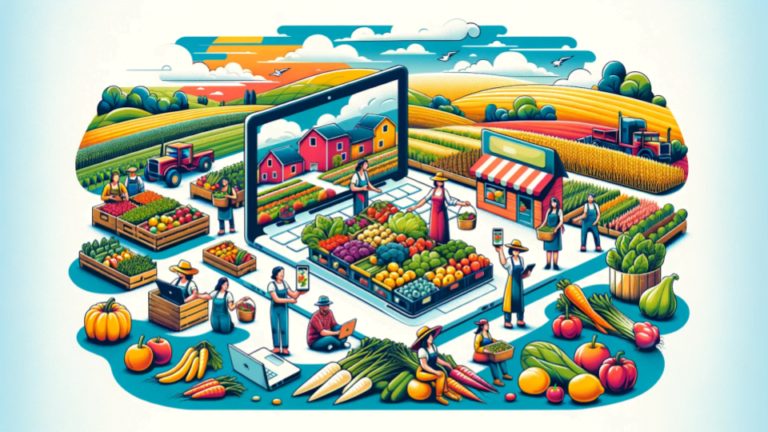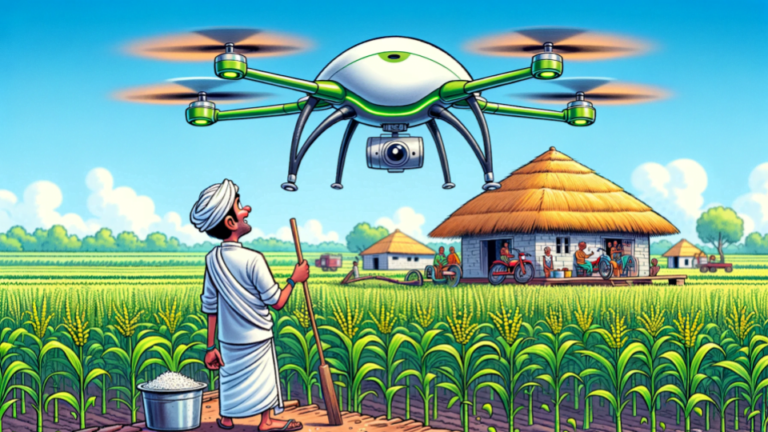Tridge: Sowing Innovation, Reaping Global Impact in Agri-Tech

Ever thought global trade was too complex? Tridge is here to make it simple. Tridge is a global agri-tech company that connects buyers and suppliers in the food and agriculture industry. They use data and technology to streamline international trade, making it easier for businesses to source products from around the world. (Tridge)
Tridge’s platform is like a bridge—hence the name, combining “trade” and “bridge.” It connects people across the globe who want to buy or sell agricultural products. Whether it’s fruits from South America or grains from Eastern Europe, Tridge has it covered. Their service is especially valuable in a world where supply chains are increasingly complex and unpredictable.
Tridge offers a data-driven platform that helps businesses find reliable suppliers and buyers. But that’s not all. They also provide market intelligence, real-time data, and end-to-end procurement services.
With operations in over 200 countries and coverage of more than 1,000 products, Tridge is transforming how the world trades agricultural goods. Their goal is to make global trade more efficient, transparent, and accessible to all, regardless of size or location. For anyone in the agri-food business, access to this kind of information is invaluable. It means better forecasts, smarter decisions, and ultimately, more robust business outcomes. (About Tridge)
From Finances to Farming: The Roots of Tridge’s Success
Hoshik Shin started his career in finance. But he quickly saw a gap in the global market that needed bridging. As a former Deutsche Bank associate, Shin had an insider’s view of the complexities and inefficiencies plaguing global trade, especially in developing countries. This experience laid the foundation for what would become Tridge. In 2015, Shin co-founded Tridge alongside Kangwook Lee and Minjong Chung. (Hoshik Shin)
A Journey Rooted in Experience
Hoshik Shin is armed with a Bachelor’s degree in Mechanical Engineering from Seoul National University and a Master’s from the University of Michigan. Before founding Tridge, he worked as a Senior Portfolio Manager at Korea Investment Corporation, gaining a deep understanding of global markets. This role highlighted the disconnect between small-scale farmers and global buyers, and it was this insight that inspired him to start Tridge.
Kangwook Lee, the Chief Operating Officer (COO) of Tridge, is instrumental in overseeing the company’s global operations. His leadership in managing logistics, international partnerships, and operational scaling has helped Tridge expand into over 40 countries. (Kangwook Lee)
Minjong Chung was the Chief Technology Officer (CTO) and was responsible for Tridge’s technological backbone. He has a background in technology and product development, making him a key figure in building and scaling the platform. (Minjong Chung)
The Birth of Tridge
In 2015, Shin co-founded Tridge in Seoul, South Korea, with a mission to revolutionize the way food and agricultural products are traded globally. The name “Tridge” is a portmanteau of “transaction” and “bridge,” reflecting the company’s goal of connecting buyers and suppliers across the world. Shin saw the potential to use technology to eliminate inefficiencies in the supply chain, allowing farmers in developing nations to access global markets directly and fairly. His vision was to create a platform that could serve as a one-stop shop for everything related to agri-food trade.
A Platform for the World
Shin’s idea quickly gained traction. Backed by major investors like SoftBank, Tridge has grown into a powerful global marketplace. The platform connects over 60,000 suppliers with 50,000+ buyers in more than 150 countries, providing not just a trading platform but also valuable market intelligence and logistics solutions.
Harvesting Opportunity: Plowing Through the Procurement Service Market
Forget the old procurement routines! The Procurement as a Service (PaaS) market is rapidly reshaping how companies handle their sourcing and supply management. As businesses increasingly turn to digital solutions to streamline operations, PaaS emerges as a critical player, offering more than just cost savings.
Surging Popularity Across Various Industries
From manufacturing to IT, various sectors are now leveraging PaaS to improve their procurement processes. This trend is particularly noticeable in manufacturing, where over 24% of the PaaS market is concentrated, focusing on enhancing supply chain dynamics and managing direct inputs and raw materials more effectively. The market was valued at USD 6.15 billion in 2022 and is expected to register a growth of 11.1% from 2023 to 2030 reaching USD 13.58 billion in 2030. (Grand View Research).
Global Expansion and Future Prospects
The PaaS market isn’t just growing; it’s booming, with a projected annual growth rate of over 10% from now until 2032. This growth is fueled by the increasing adoption of advanced technologies like AI and machine learning which streamline the sourcing and negotiation processes. North America currently leads this market, with substantial adoption rates thanks to its robust technological infrastructure (Future Insights).
Despite its numerous benefits, the PaaS sector faces challenges such as a lack of awareness and technological expertise, which can hinder market growth. However, the rising trend of digitalization and the continuous innovations in AI and machine learning are expected to drive future growth, helping businesses navigate the complexities of global procurement more effectively.
Cultivating Success: Tridge’s Blueprint for a Better Agri-Future
Vision and Mission: Setting the Course
Tridge is committed to revolutionizing global trade. Their vision is to become the most trusted provider of reliable data, insights, and networks for global agri-food supply chains (AFSC). They aim to empower a sustainable, equitable, and resilient future in this sector for generations to come. Their mission is centered on facilitating safe transactions and making well-informed business decisions accessible to all through their robust data and intelligence operations.
Solving Industry Problems: A Focused Approach
Tridge tackles several key problems in global trade, especially within the food and agriculture sectors. Their platform addresses issues like market inefficiency, lack of transparency, and the traditional complexities of cross-border trading. By providing data-driven insights and a reliable network of suppliers and buyers, Tridge helps streamline the trading process, making it more transparent and efficient. This approach not only aids in resolving supply disruptions but also enhances the overall supply chain stability during global crises, such as the pandemic.
Business Model: Innovation at Its Core
Tridge operates on a dynamic business model that leverages technology to connect global food agriculture buyers and sellers directly, bypassing traditional intermediaries. This model is built around a crowd-sourced network of Tridge Finders and sourcing agents who provide market intelligence and buyer leads. They engage in every step of the trade process, from demand identification to supplier negotiation and logistics management. This extensive network is supported by digital platforms that facilitate market intelligence and order fulfillment, ensuring that transactions are not only possible but optimized across the globe.
A Basket Full of Solutions: Tridge’s Bounty of Products and Services
Tridge is reshaping global agri-food trade with a suite of comprehensive solutions aimed at enhancing efficiency and transparency. Tridge’s platform offers a vast array of products, covering over 14,000 items across various categories like fruits, vegetables, grains, seafood, and meat. Whether you’re looking for fresh produce or specialized ingredients, Tridge has it covered. This extensive catalog allows businesses to source high-quality products from different regions, ensuring a steady and diverse supply even during market fluctuations. (Portfolio)
Innovative Services
- Sourcing Hub: Recently launched, this service is designed to optimize the sourcing processes by offering buyers access to a network of verified suppliers. This helps save time and resources, making the buying process more efficient and less cumbersome. (Sourcing Hub)
- Fulfillment Solutions: Tridge provides end-to-end solutions that manage everything from production to delivery. This service ensures that all aspects of the trade process are covered, giving buyers peace of mind. (Fulfillment Solutions)
- Data and Intelligence: At the heart of Tridge’s operation is its commitment to data-driven solutions. They offer detailed market intelligence, which allows buyers and sellers to make informed decisions based on the latest market data and trends. (Data and Intelligence)
Specialized Features
- Market Intelligence Platforms: These platforms are crucial for providing actionable insights into pricing, trends, and supply chain dynamics, which are essential for businesses looking to navigate the complexities of global trade. (Market Intelligence)
- Social Marketplace: A unique feature that combines the capabilities of a traditional marketplace with the dynamics of a social platform, facilitating direct interactions between buyers and sellers.
- Global Network of Tridge Finders: Tridge employs a crowd-sourced network of local experts, known as Tridge Finders, who provide on-the-ground intelligence and help identify reliable suppliers. This network spans over 150 countries, making it easier to find trusted partners and access hard-to-reach markets.
- End-to-End Logistics: Tridge doesn’t just find the products; they ensure they reach you in perfect condition. Their logistics services cover everything from shipping to quality inspections, so you can trust that your products will arrive as expected, no matter where they’re coming from.
How Tridge Works: Streamlining Global Agri-Food Trade
Tridge transforms global trade with a streamlined process that begins with the crowdsourcing of business leads through its network of industry experts, known as Tridge Finders. These Finders are the backbone of Tridge’s operations, identifying buyer and supplier leads by leveraging their local market intelligence. They are compensated for their contributions in identifying potential business opportunities, which significantly enhances the sourcing process.
From Identification to Delivery
- Demand and Supply Identification: Tridge’s sophisticated network identifies market demands and connects them with supply capabilities. This system enables rapid response to market needs and trends.
- Supplier and Buyer Matching: Once a demand is recognized, Tridge uses its global network to match these demands with the right suppliers. This process is supported by comprehensive sourcing research and negotiations handled by Tridge Finders and the local salesforce.
- Contracting and Fulfillment: After successful negotiations, Tridge oversees the contracting and logistical arrangements to ensure smooth transaction completion from supplier to buyer.
- Logistics and Delivery: Tridge’s operational team manages logistics, ensuring that the order is delivered efficiently and meets the quality standards expected by the buyer.
Ripe for Recognition: Tridge’s Fruitful Impact on Global Markets
Tridge has made significant waves in the agri-tech sector, earning the prestigious “Unicorn” status from the Korean government. This designation is reserved for startups valued at over $1 billion, underscoring Tridge’s rapid growth and substantial impact on the global agriculture market. (Unicorn Status)
Tridge is at the forefront of incorporating Environmental, Social, and Governance (ESG) standards into the food industry. Their initiatives aim to transform the supply chain with sustainable practices, such as enhancing transparency and reducing food waste, positioning Tridge as a leader in ESG transformation within the food sector.
Tridge’s impact on the global market is significant. With a platform that processes and analyzes over 2 million new data points weekly, Tridge helps companies make better decisions in an increasingly volatile market. The company has facilitated unprecedented trade opportunities, connecting markets as diverse as Brazil and Egypt, and capitalizing on trends like the rising popularity of K-food across the globe. (Impact)
In 2024, Tridge played a pivotal role at the World FoodTech Conference, with CEO Hoshik Shin delivering the keynote address. Furthermore, Tridge is anticipated to receive accolades at the upcoming UNIDO Global Call 2024, which will recognize companies contributing to sustainable industrial development.
Partnerships and Collaborations: Expanding Global Reach
In 2024, Tridge solidified its presence in Africa by signing several key agreements with the Pan African Chamber of Commerce (PACCI) and the Federation of West African Chambers of Commerce & Industry (FEWACCI). These partnerships aim to enhance data exchange and promote trade between Africa and global markets. Tridge’s collaboration with these organizations is part of a broader strategy to leverage Africa’s vast agricultural potential and integrate it into the global agri-food supply chain. (PACCI Partnership)
Tridge also took significant steps in Southeast Asia by partnering with Indonesia’s National Research and Innovation Agency (BRIN). This collaboration focuses on empowering Indonesia’s agricultural sector through data-driven innovations, including smart farms and digital agriculture initiatives. (BRIN Partnership)
Tridge is also heavily involved in promoting Korean agricultural products abroad. In collaboration with the Korean government, Tridge is working to expand K-Food markets globally, particularly through its Social Marketplace, which supports small and medium-sized enterprises (SMEs) in reaching international buyers.
Sprouting Investments: The Financial Growth of Tridge
Since its inception in 2015, Tridge has rapidly grown, securing significant investments. Tridge’s financial trajectory is nothing short of impressive. From its early seed funding to its latest Series D round, Tridge has consistently attracted significant investment. (Tracxn)
Key Funding Rounds
- Nov 2016 – Seed Round: Tridge secured $2.7 million in its seed round, laying the foundation for its early growth. This round saw participation from early institutional investors like SoftBank Ventures Asia (SBVA).
- Jul 2018 – Series A: Tridge raised $1.94 million in its Series A, which helped the company scale its platform and expand its market presence. The round also had contributions from SBVA, solidifying their confidence in Tridge’s potential.
- Nov 2019 – Series A Extension: Continuing its growth, Tridge garnered an additional $10.5 million. This funding was pivotal in enhancing its data-driven capabilities and further expanding its network.
- Apr 2020 – Series B: In the wake of the global pandemic, Tridge raised $11 million, a testament to its robust business model even in uncertain times. This round was led by SBVA and supported by other key investors.
- Jul 2021 – Series C: Tridge reached a significant milestone with a $60 million Series C round, pushing its valuation to $500 million. This round was led by Forest Partners, reflecting the growing trust in Tridge’s ability to revolutionize global trade.
- Aug 2022 – Series D: Tridge’s most recent Series D round brought in $37.2 million, boosting its valuation to an impressive $2.7 billion. This round was led by DS Asset Management, marking Tridge’s rise as a unicorn in the AgTech space.
Tridge’s revenue growth has mirrored its success in securing funding. The company’s revenue surged from $2.3 billion in FY 2019 to $9 billion in FY 2020, reflecting its expanding market presence. By FY 2021, Tridge’s revenue had grown to $13.8 billion, and in FY 2022, it reached an impressive $15.8 billion. These figures underscore Tridge’s rapid scaling and its ability to effectively monetize its platform, solidifying its position as a leader in the global agri-food industry.
Conclusion: Tridge’s Path Forward
Tridge has proven itself as a transformative force in the global agri-food industry. By combining innovative technology with a deep understanding of market dynamics, Tridge has not only connected buyers and suppliers but has also redefined how global trade operates.
From its humble beginnings to becoming South Korea’s first AgTech unicorn, Tridge’s journey is a story of strategic growth and visionary leadership.Through its comprehensive suite of services and a vast global network, Tridge offers unparalleled solutions that address the complex challenges of global trade. Looking ahead, Tridge is poised to expand its influence even further.
Don’t just dream—take the first step towards your own entrepreneurial success. Whether you’re in tech, agriculture, or any other sector, the time to act is now. Start by exploring new opportunities, building partnerships, and leveraging data just like Tridge did.
For more inspiration and insights, check out other articles on Venture Kites. Dive deep into the world of startups, funding strategies, and innovation that can propel your ideas to the next level.
At a Glance with DORK Company

Dive In with Venture Kites
Lessons From Tridge
The Power of Data-Driven Decisions
The Lesson & Why it Matters: Data-driven decisions are critical for navigating complex markets. They help companies reduce risks, optimize operations, and predict trends effectively.
Implementation: Implement data analytics tools in every aspect of your business, from marketing to supply chain management. Regularly review and adjust strategies based on the insights gained.
How Tridge Implements It: Tridge uses data as the backbone of its operations. By analyzing over 2 million new data points weekly, Tridge provides actionable insights to its clients, helping them make informed decisions in the volatile agri-food market.
Building a Global Network
The Lesson & Why it Matters: A strong global network opens doors to new opportunities and markets. It enables businesses to scale faster and more efficiently.
Implementation: Develop strategic partnerships and expand your business connections across different regions. Utilize digital platforms to connect with global partners.
How Tridge Implements It: Tridge has established a global network of over 20,000 industry experts, known as Tridge Finders. This network helps Tridge quickly identify market demands and match them with the right suppliers.
Adaptability in Crisis
The Lesson & Why it Matters: Businesses must be adaptable to survive and thrive during crises. Flexibility allows companies to pivot and seize new opportunities during uncertain times.
Implementation: Build a business model that can quickly adapt to changes in the market. Encourage a culture of flexibility and innovation within your team.
How Tridge Implements It: During the COVID-19 pandemic, Tridge adapted its operations to address supply chain disruptions. The company’s flexibility allowed it to continue providing essential services to its clients despite global challenges.
Prioritize Transparency
The Lesson & Why it Matters: Transparency builds trust, which is essential for long-term customer relationships and brand reputation.
Implementation: Be open about your processes, pricing, and business practices. Ensure that communication with customers and partners is clear and honest.
How Tridge Implements It: Tridge emphasizes transparency by providing clear and accurate information about suppliers, pricing, and market conditions, helping to build trust in the global market.
Resilience Through Diversification
The Lesson & Why it Matters: Diversification helps mitigate risk and provides multiple revenue streams. It makes a company more resilient to market fluctuations.
Implementation: Diversify your product offerings and explore new markets. Balance your portfolio to minimize risks and maximize growth potential.
How Tridge Implements It: Tridge has diversified its services and markets, ensuring that it remains resilient in the face of global market changes and disruptions.
Author Details
Creative Head – Mrs. Shemi K Kandoth
Content By Dork Company
Art By Dork Company
Instagram Feed
X (Twitter) Feed
Ever wonder how your produce get from a farm to your grocery aisle? Meet @TridgeGlobal founded by Hoshik Shin and team from Seoul.
— Venture Kites (@VentureKites) October 13, 2024
Full Story @VentureKites:https://t.co/Gq6BiblpgV
Proudly crafted in collaboration with @dorkcompany_ – https://t.co/9nMJIiMPU9 pic.twitter.com/3eSobdqcjk











